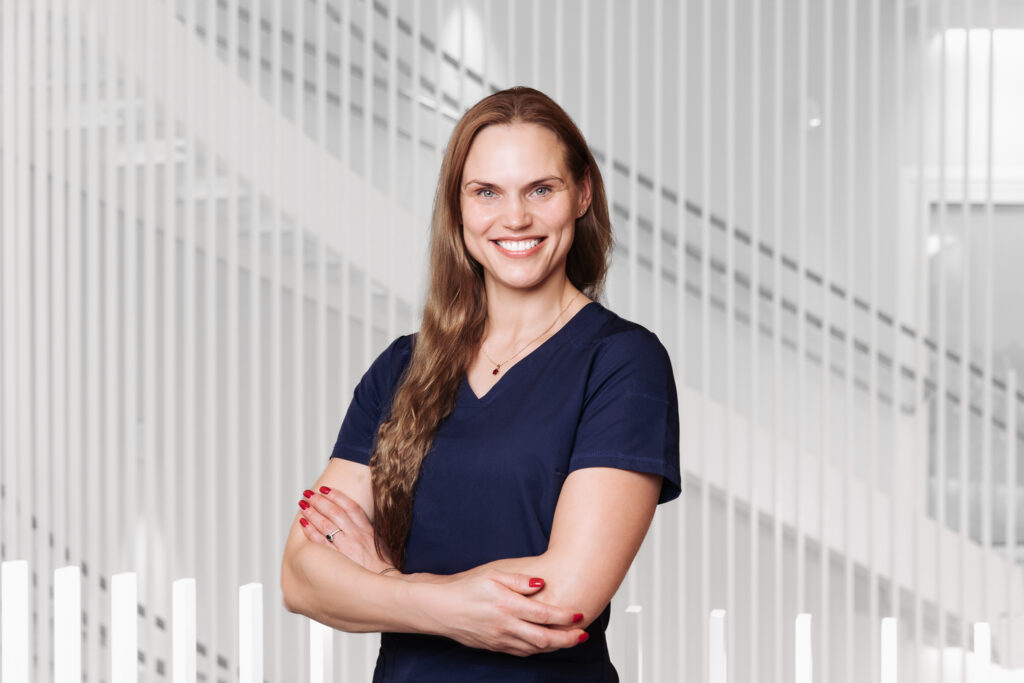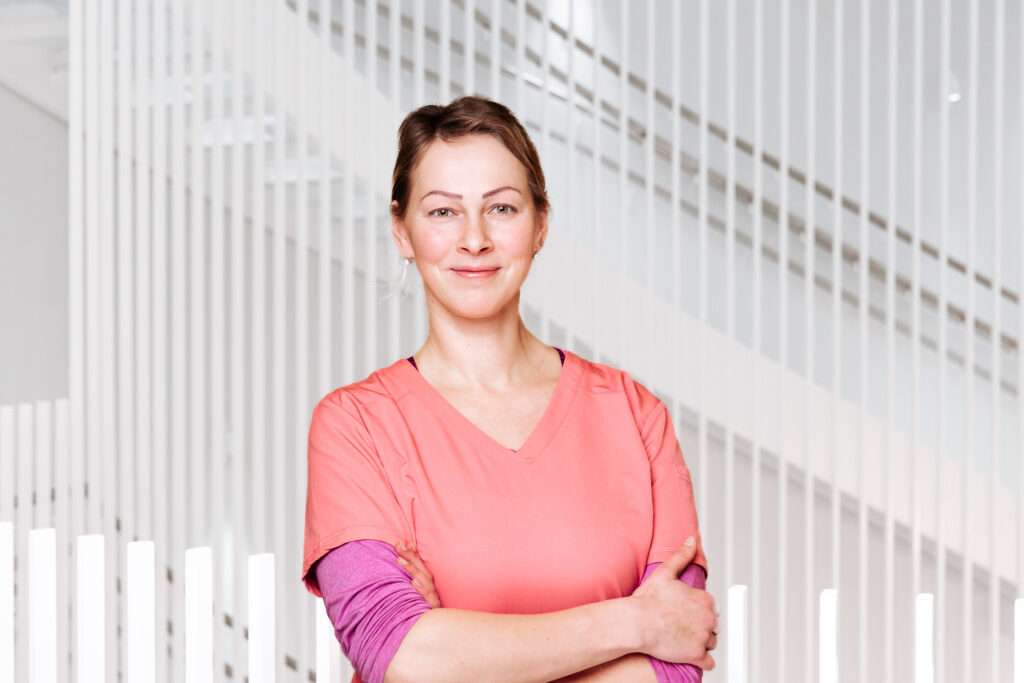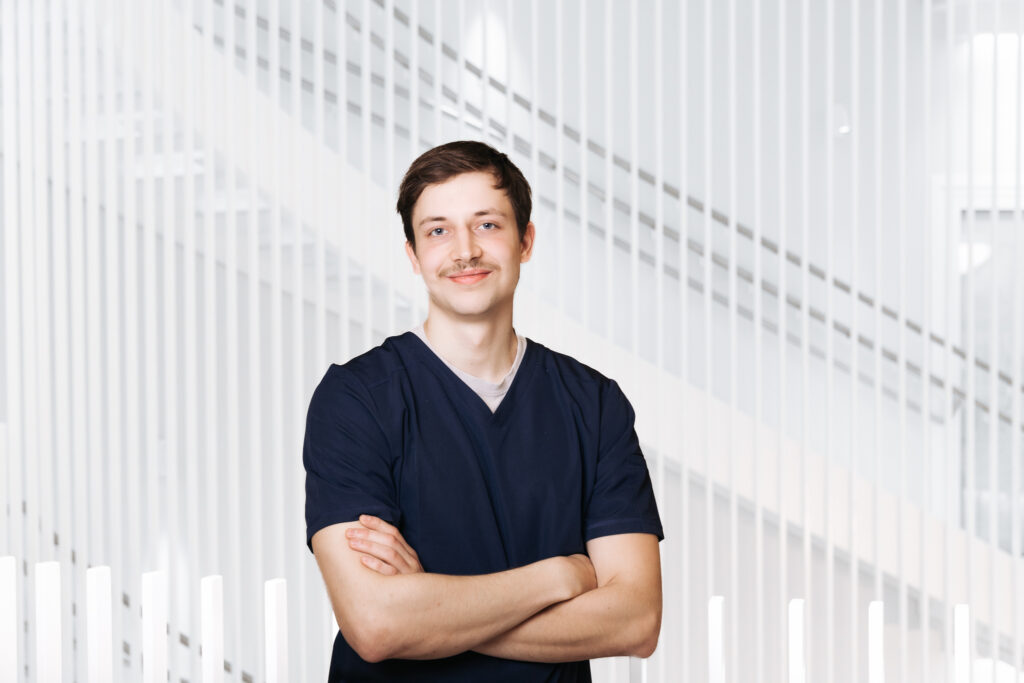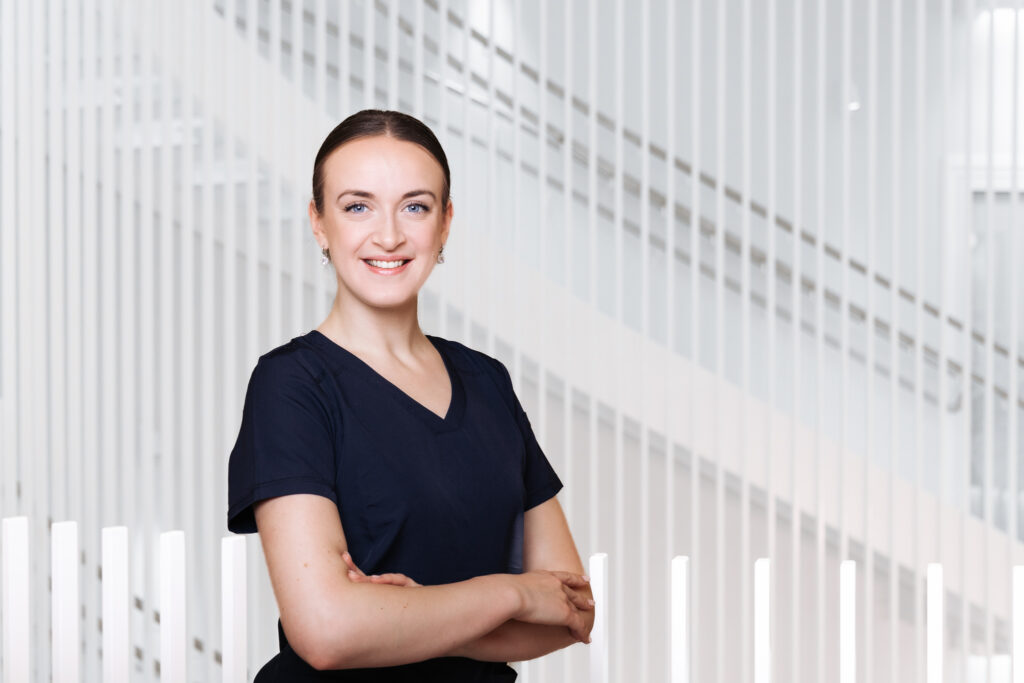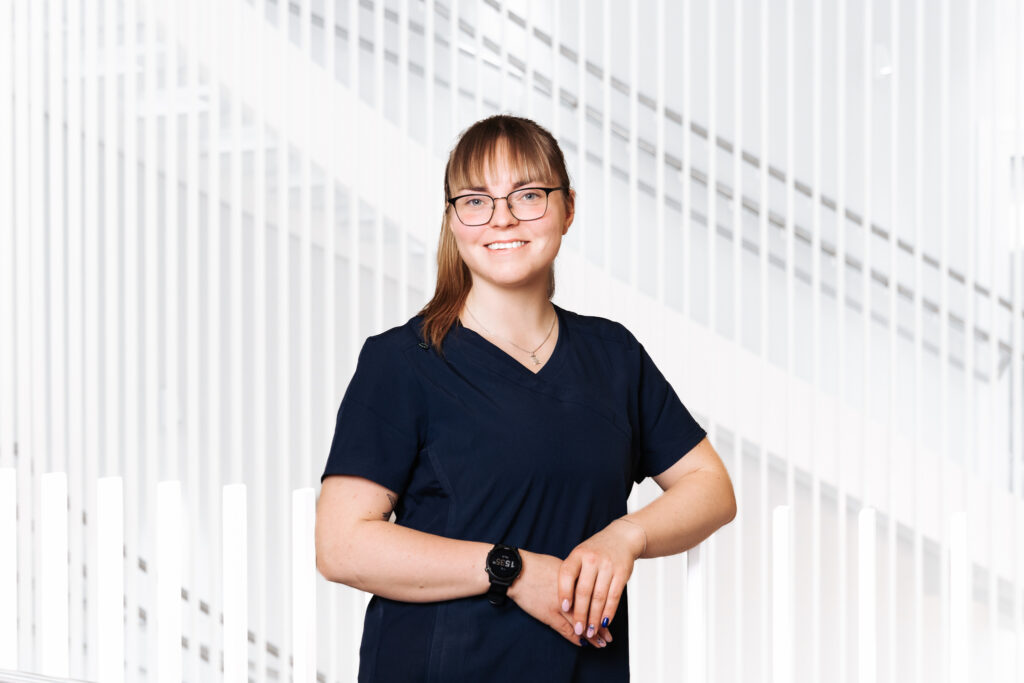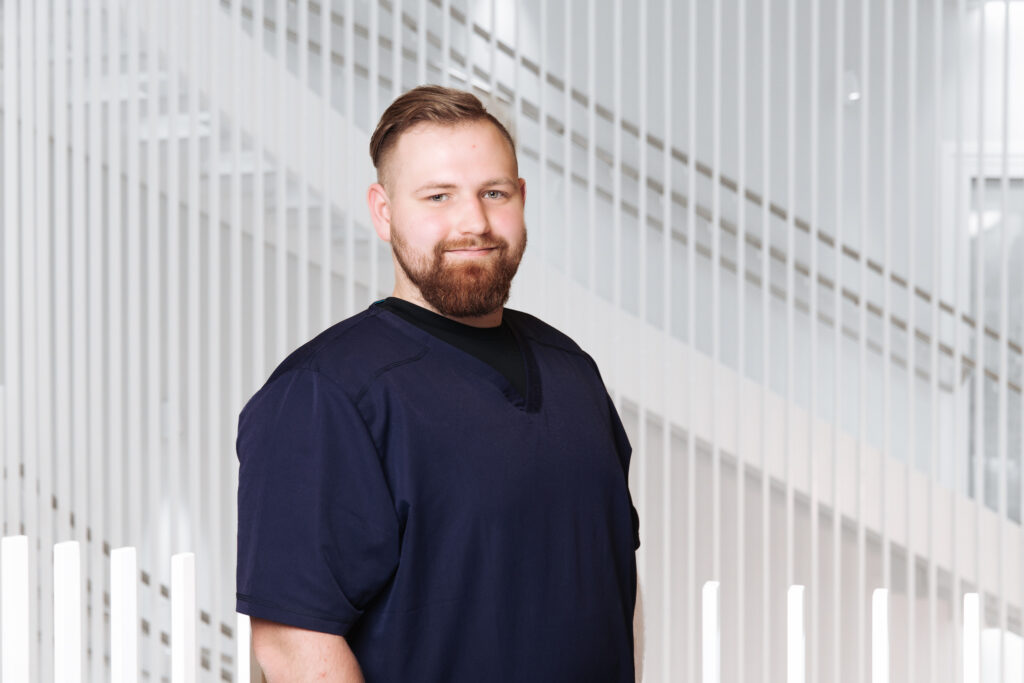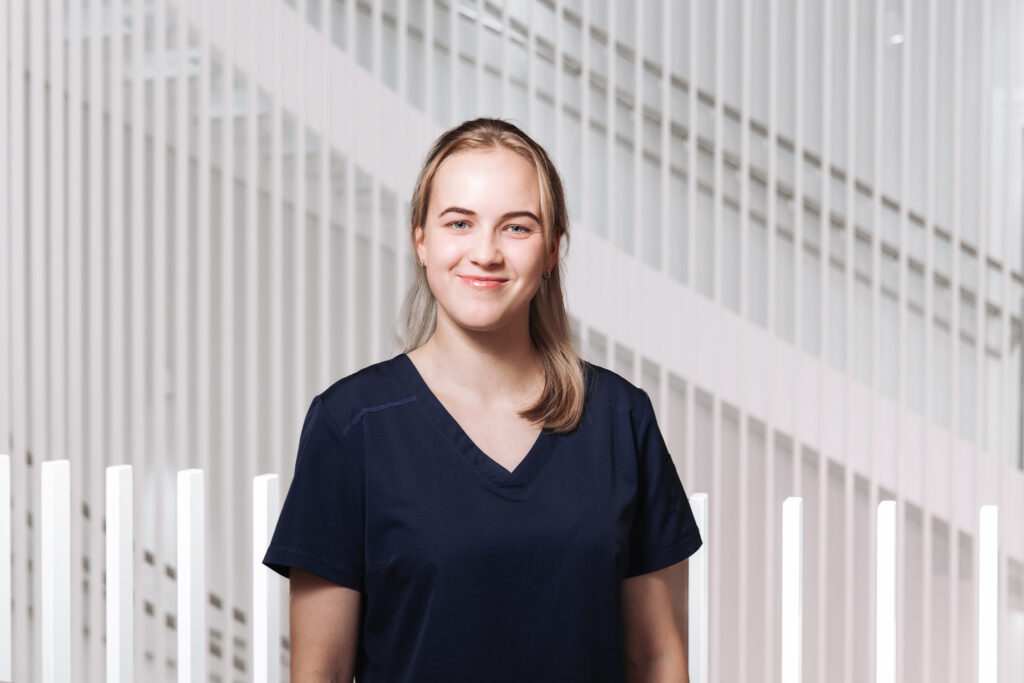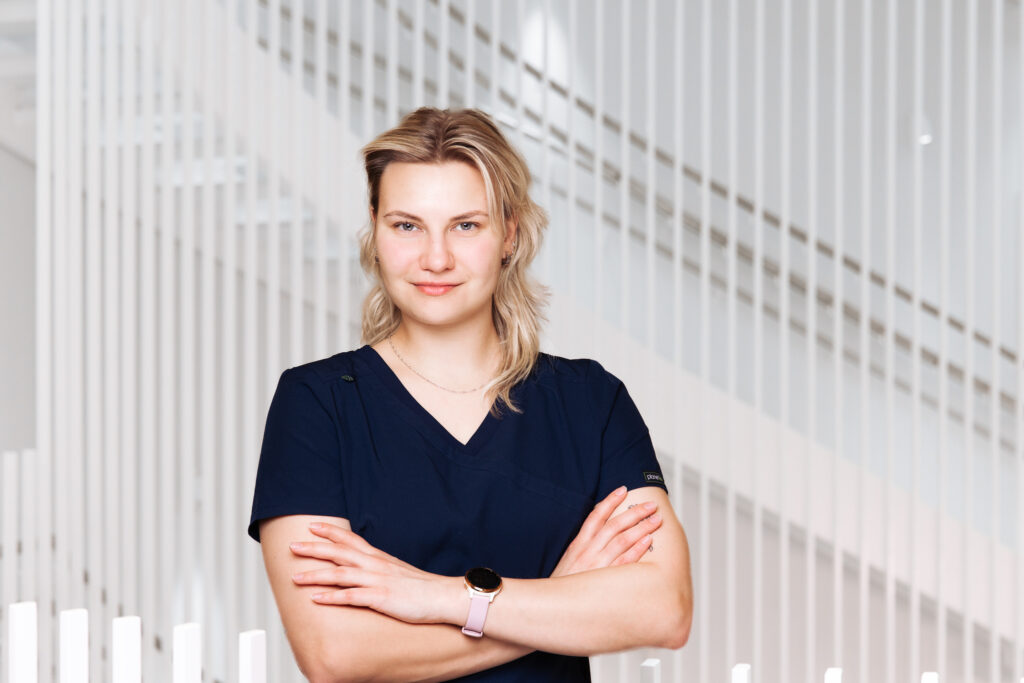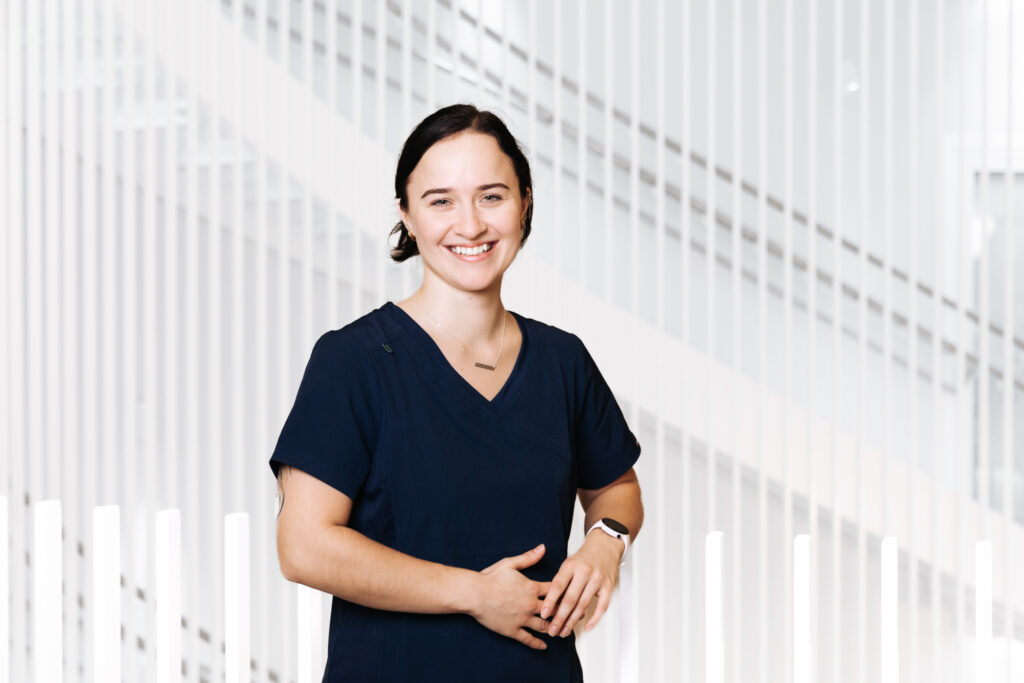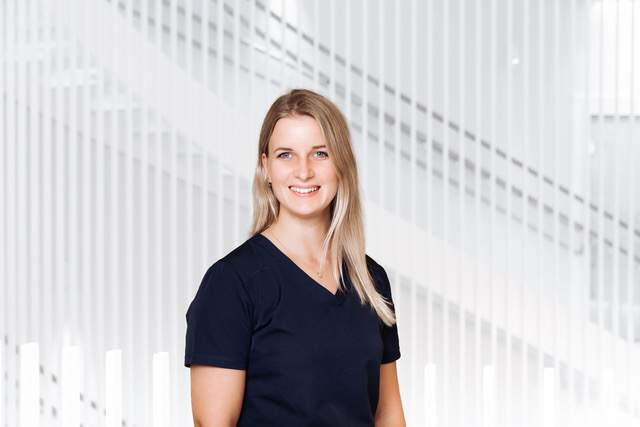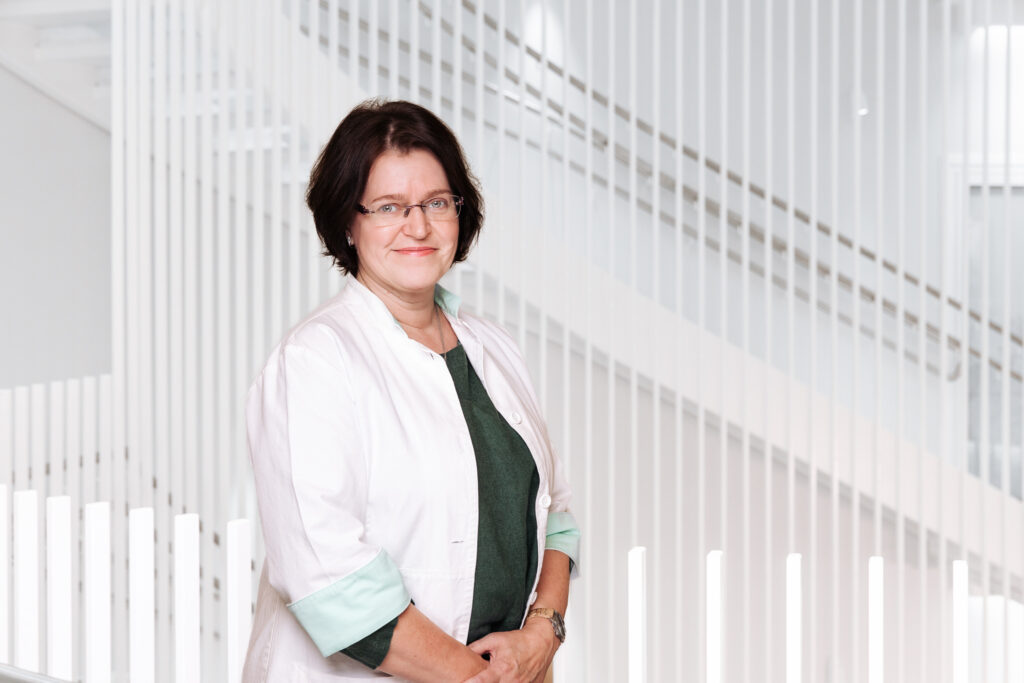Our specialists
Ülemiste Physiotherapy Clinic combines in-depth knowledge and skills, an evidence-based approach, and dedication to find the best solutions for your health.
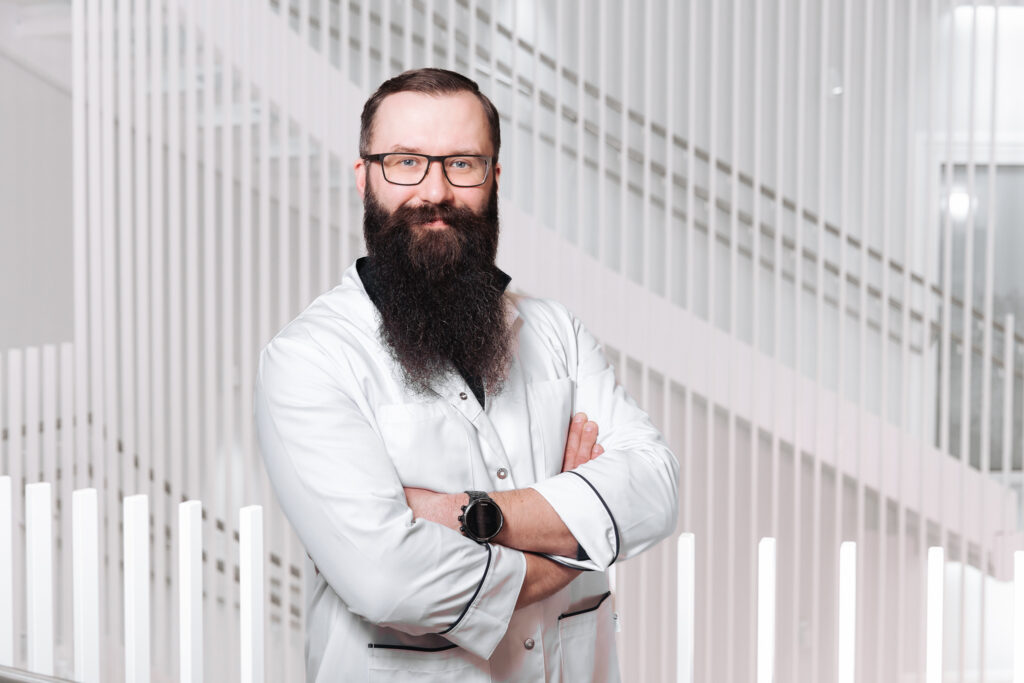
Artjom Timtšuk
Head of the Physiotherapy Clinic
Working languages: Estonian, English, Russian
Artjom is an experienced physiotherapist and manager who graduated in Physiotherapy from the University of Tartu and is currently pursuing a Master’s degree in Organizational Behaviour at Tallinn University.
He has worked as a physiotherapist at the post-amputation rehabilitation center of East Tallinn Central Hospital and has led development projects in a rehabilitation clinic. At the North Estonia Medical Centre, he served as the lead physiotherapist in the rehabilitation outpatient clinic. In addition, Artjom has collaborated with several health technology development teams, providing them with clinical support.
Professionally, Artjom is most interested in orthopedic problems and injuries, pre- and post-operative physiotherapy, and working with patients who have undergone limb amputation. He values an evidence-based approach and continuous professional development, regularly participating in specialized training and conferences, as well as sharing his own knowledge as a speaker and trainer. Artjom is a member of the Estonian Physiotherapists’ Association.
When working with patients, Artjom focuses on providing support and tools that help people help themselves. His goal is to motivate and guide patients rather than create dependence on the therapist. “The most rewarding moments are when even patients with difficult prognoses achieve results they themselves didn’t believe in,” says Artjom.
Artjom is inspired by the constant development of physiotherapy as a field and its growing impact on people’s quality of life. “Physiotherapy is becoming increasingly evidence-based, and the range of problems we are able to help solve is continuously expanding,” he affirms.
Maret graduated from the University of Tartu with a Master’s degree in Pharmacy and a Bachelor’s degree in Physiotherapy, both cum laude. She is currently completing her Master’s studies in Physiotherapy at the University of Tartu.
She has worked both in hospitals and private practice, gaining extensive knowledge and practical skills. Maret is particularly interested in sports physiotherapy, post-trauma and post-surgical physiotherapy, solving musculoskeletal problems, work ergonomics, overuse injuries, cardiopulmonary rehabilitation, and geriatric physiotherapy aimed at the elderly.
Maret is a member of the Estonian Physiotherapists’ Association and keeps herself up to date with the latest research and treatment methods by regularly attending further training and reading professional literature.
What makes Maret happiest is being able to help and support people. She believes that clear and open communication helps to understand patients’ needs, expectations, and concerns, and to set realistic goals. It is important to actively involve and motivate patients in the treatment process, as, according to Maret, the key to successful recovery is consistent work over time. In addition to empathy, building trust, and good cooperation with the patient, she considers an evidence-based approach essential.
Anneli graduated in Physiotherapy from Tartu Health Care College and additionally obtained a Master’s degree in E-Government Services from TalTech. She has worked in physiotherapy for nearly nine years, during which she has extensively treated babies, toddlers, and school-aged children. Among other qualifications, Anneli holds a Schroth therapist license required for the conservative treatment of scoliosis.
In physiotherapy, Anneli has a Level 7 professional certificate. She keeps developing professionally by reading scientific literature and regularly attending various trainings and conferences. Her professional interests include trauma and other orthopedic topics, chronic pain and diseases, as well as the physical and mental health of children.
For Anneli, raising general health awareness among both children and adults is important. She supports a holistic and multidisciplinary approach: our well-being is influenced by many different factors that need to be addressed in parallel. As a physiotherapist, she sees herself as a supportive link in people’s health recovery journey, providing information, support, encouragement, and ways for independent activity and home exercise.
“Most of the time, there isn’t a single certain way to get pain under control, recover from injuries, or solve complaints. What matters most is the cooperation and compatibility between the person in need and the physiotherapist,” Anneli believes.
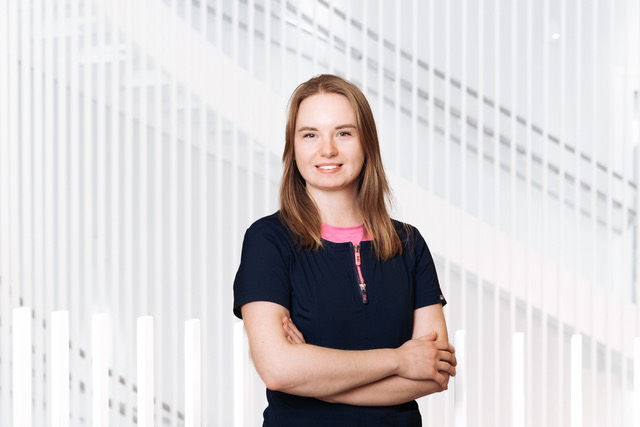
Diana Trutneva
Physiotherapist
Working languages: Estonian, English, Russian, Spanish
Diana graduated in Physiotherapy from Tartu Health Care College and is a member of the Estonian Physiotherapists’ Association. She has further trained in various courses, including joint problems, oncological and cardiopulmonary treatment, as well as the NDT (neurodevelopmental treatment) method.
Diana’s diverse experience includes working at the Narva Polyclinic as well as in a physiotherapy practice in Peru. At Medicum, she has worked with patients suffering from severe pulmonary, cardiac, and oncological diseases, a field that continues to interest her to this day. She also finds meaningful challenges in helping people with neurological problems.
As human health requires very broad knowledge, Diana considers continuous self-development important—through reading, attending courses, and participating in conferences. In addition to knowledge, ongoing learning also provides new energy for her work. “The body and mind are closely connected. Therefore, listening to a person and thoroughly understanding the problem is the main key to solving any health issue,” Diana affirms.
Aarto obtained his Bachelor’s degree at the European School of Physiotherapy, which is part of the Amsterdam University of Applied Sciences.
During his studies, he completed internships in a wide range of organizations, including a children’s hospital in South Africa. As a physiotherapist, Aarto has worked with football clubs in the Netherlands (AFC DWS) and Estonia (Harju JK Laagri), helping young athletes cope with sports injuries. He also spent several years at the North Estonia Medical Centre, working in intensive care, inpatient, and outpatient departments. There, Aarto treated patients with a wide variety of issues, including musculoskeletal problems, neurological conditions, post-trauma care, and cardiac-related concerns.
Aarto considers continuous professional development essential. He regularly reads medical literature, follows the latest scientific articles, and attends physiotherapy trainings.
In his work, Aarto values an evidence-based, individual, and flexible approach. He believes it is very important for people to understand the root causes of their problems, encouraging them to embrace change and progress. “Just like training, therapy should be an enjoyable process rather than an obligation,” Aarto adds.
Liisi graduated in Physiotherapy from the University of Tartu and obtained a Bachelor’s degree in Health Sciences.
She began her career at the Haapsalu Neurological Rehabilitation Centre, where she mainly worked with children with neurological deficits who had physical or intellectual disabilities. She continued her professional journey at West Tallinn Central Hospital, providing physiotherapy services to patients diagnosed with multiple sclerosis, Parkinson’s disease, and those recovering from a recent stroke. In addition, Liisi has provided therapy as a home service, focusing primarily on patients with brain and spinal cord injuries, as well as those with milder musculoskeletal complaints.
Liisi is a member of the Estonian Physiotherapists’ Association and keeps herself up to date with developments in the field by attending online courses and listening to professional podcasts.
She values the development of regular movement habits, which help both in recovery and in preventing many health problems. Liisi strongly believes in the saying “a healthy mind in a healthy body” – movement supports both physical and mental well-being.
Kätlin graduated with a Bachelor’s degree in Physiotherapy from the University of Tartu. As a physiotherapist, she has worked for several years with athletes and members of the Defence Forces. She is currently focused mainly on patients with injuries and orthopedic problems, as well as athletes.
Kätlin has consistently advanced her expertise in sports physiotherapy by attending conferences and trainings in the field.
When helping patients, Kätlin finds it important to integrate rehabilitation into everyday activities—this way, it doesn’t feel like a tedious extra obligation. She believes that achieving the best results requires honest and open communication in order to create a recovery plan tailored to each individual.
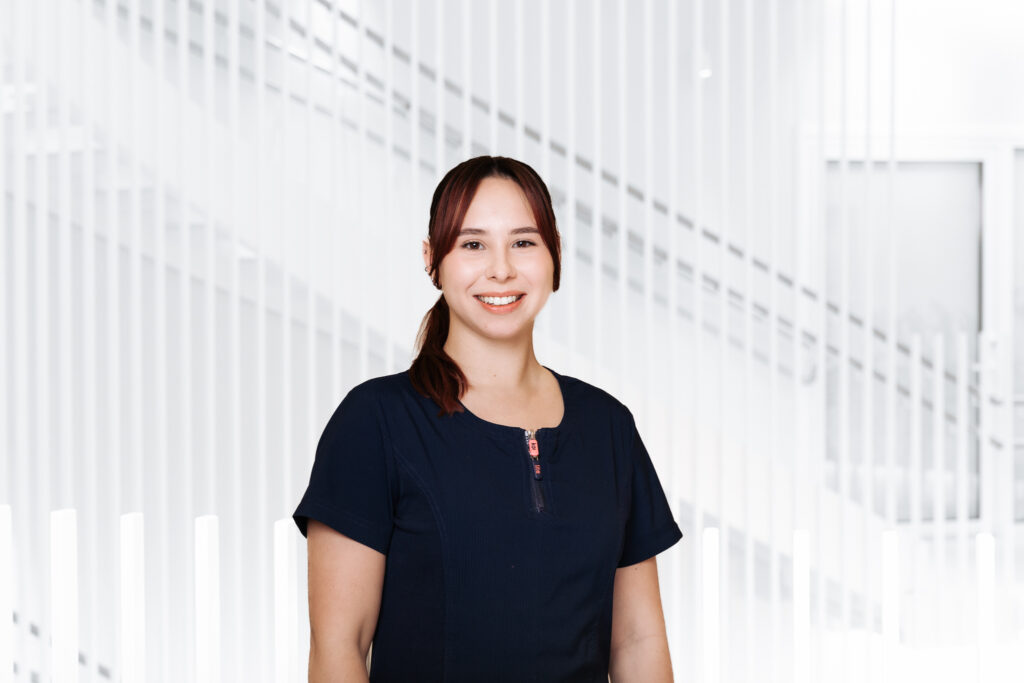
Anna-Maria Drobuževa
Physiotherapist
Working languages: Estonian, Russian, English
Anna-Maria graduated in Physiotherapy from Tartu Health Care College and in Contemporary Dance from the Tallinn Ballet School.
She has worked as a sports physiotherapist in basketball with the men’s U21 and girls’ U16 national teams, as well as at the Tartu Basketball Academy. She also has experience in football, working as a sports physiotherapist with Harju JK Laagri’s first team and the girls’ U15 national team. In addition, Anna-Maria has worked in a private clinic and is a member of the Estonian Physiotherapists’ Association.
Anna-Maria specializes in sports physiotherapy, which includes assessing post-traumatic conditions, designing and implementing training and rehabilitation plans for recovery. She is particularly interested in treating orthopedic injuries, including finger and toe problems.
She believes that it is not the therapist who heals the patient, but rather the patient who heals themselves—thanks to the knowledge and skills that Anna-Maria shares during therapy. What motivates her most is the joy in a patient’s eyes when they have found a solution to their problem.
Ragnar graduated in Physiotherapy from Tartu Health Care College. Previously, he worked at the outpatient rehabilitation center of East Tallinn Central Hospital and carried out health checks for young athletes at Terviseuuringud.
Ragnar is most interested in and challenged by solving post-trauma and post-surgical health problems related to shoulders, knees, hips, or ankles. He enjoys working with a variety of cases, which brings diversity and variety to his daily work.
Ragnar believes that an important part of physiotherapy is raising patient awareness—his goal is to help people better understand their bodies and the causes of their health issues. He encourages his patients to actively engage in rehabilitation and prevention, emphasizing the importance of diverse physical activity. In this way, patients don’t just leave with a one-time solution but also gain the knowledge of how to independently support their health and prevent new problems.
Ann Brit obtained her Professional Higher Education degree in Physiotherapy from Tartu Health Care College and a Master’s degree from the University of Tartu.
She began her career as a physiotherapist in an inpatient rehabilitation department, later moved to the orthopedics department, and also started providing outpatient consultations for patients. In addition, Ann Brit has specialized in sports physiotherapy and trained as a personal trainer at IntensivePT.
Her main areas of interest are sports physiotherapy and orthopedics, particularly the treatment of injuries. She keeps up with developments in the field by attending conferences and trainings, as well as reading professional literature.
In her work, Ann Brit values an evidence-based approach but considers it equally important to take into account the patient’s individual goals. She believes that supporting health requires developing lasting habits of daily physical activity. “What motivates me is helping people return to their sports, work, or other everyday routines, because I know how important this is for mental health and overall well-being,” says Ann Brit.
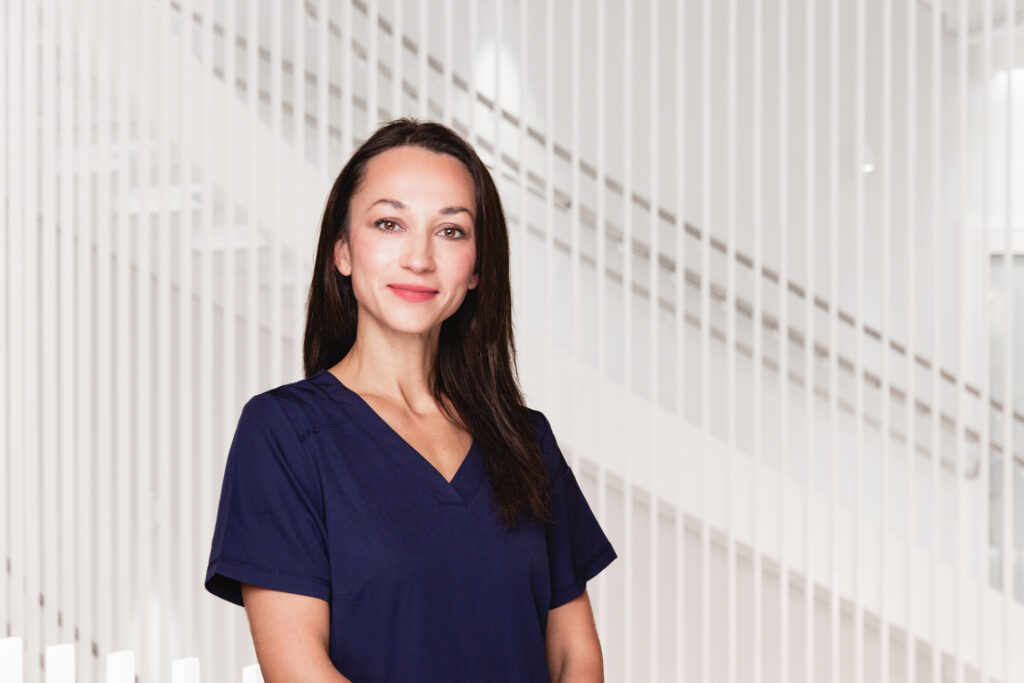
Tamara Gebenova
Physiotherapist
Working languages: Estonian, English, Russian, Spanish
Tamara graduated in Physiotherapy from the University of Tartu. She has worked as a physiotherapist for over ten years, most extensively at the North Estonia Medical Centre.
Tamara welcomes everyone who is seeking solutions to orthopedic problems or needs help recovering from injuries, sports traumas, or post-surgical conditions.
According to Tamara, working with patients is very interesting, diverse, and rewarding. “Achieving good results requires open communication, patient motivation, and cooperation with the therapist,” she emphasizes. Tamara believes that the key to recovery is regularity and consistency—small steps can take you far.
Anna-Brit holds a Bachelor’s degree in Physiotherapy from Tartu Health Care College. She has worked as a physiotherapist at the North Estonia Medical Centre and with the Tallinn Kalev Football Club, and she occasionally substitutes for physiotherapists at sports clubs. Anna-Brit is particularly interested in orthopedic problems and sports injuries, as well as post-surgical rehabilitation.
She keeps herself up to date with the latest research and new, interesting exercises to teach patients, and she continues to expand her knowledge through various trainings.
Anna-Brit believes that the patient’s own motivation is already half the success in physiotherapy. Together with the patient, she sets clear goals to be achieved during the therapy process. “I try to create a friendly and positive atmosphere already at the first meeting, I value honesty in communication with the patient, and I believe that results depend on mutual trust,” explains Anna-Brit. What brings her joy at work is seeing that her patients have benefited from her help.
Mona Mia graduated in Physiotherapy from Tartu Health Care College. Through work experience and further training, she has specialized in pelvic floor physiotherapy, women’s health, and post-trauma physiotherapy.
She regularly develops her expertise at conferences and trainings that cover pelvic problems, sexual health, and broader professional topics. Mona Mia is a member of the Estonian Physiotherapists’ Association, the Estonian Pelvic Floor Disorders Society, and the Estonian Sexual Health Association.
In working with patients, Mona Mia places great importance on an individual approach and viewing the person as a whole. For her, beyond the patient’s recovery, it is essential that by the end of therapy the person also has a lasting interest in maintaining their own health and well-being through movement.
Kaisa-Kristina obtained her Bachelor’s degree in Physiotherapy from the University of Tartu and her Master’s degree in Musculoskeletal Sport Science and Health from Loughborough University in the United Kingdom.
Previously, Kaisa-Kristina worked at the orthopedics department of the North Estonia Medical Centre (PERH) as a physiotherapist-coordinator. She is currently active on several fronts, working as a lead physiotherapist and providing outpatient care for post-trauma patients. Her main professional interests lie in orthopedic problems and injuries, as well as pre- and post-operative physiotherapy.
For Kaisa-Kristina, continuous learning and skill development are essential—she keeps up with the latest treatment guidelines and regularly attends professional trainings and conferences. She is also a member of the Estonian Physiotherapists’ Association.
Kaisa-Kristina views physiotherapy as part of a broader mission to promote health and physical activity in society. She is motivated by the knowledge that through the therapy process she can help patients improve their quality of life and confidence, and return to an active everyday life.
Entoni-Timmo graduated from the Faculty of Medicine at the University of Tartu and is currently completing his residency in radiology. As a resident, he has worked in all major hospitals in Tallinn (PERH, ITK, and LTKH) and has also practiced as a general physician in Finland.
For Entoni-Timmo, the most important and fascinating aspect of medicine is diagnostics—making the right diagnosis quickly can significantly improve both the effectiveness of treatment and the patient’s prognosis.
He believes that life is continuous learning—he regularly develops his knowledge at trainings, conferences, and seminars.
In his work, Entoni-Timmo values precision, efficiency, and humanity. “I always try to speak to patients in simple and understandable language. For me, this is not only a professional obligation but also an expression of respect,” he emphasizes.
During visits, he thoroughly explains the situation, test results, and all necessary information to the patient. Entoni-Timmo considers his strengths to be attention to detail, continuous professional development, and clear communication that patients can easily understand.

Elina Badalyan
Rehabilitation and sports doctor
Working languages: Estonian, English
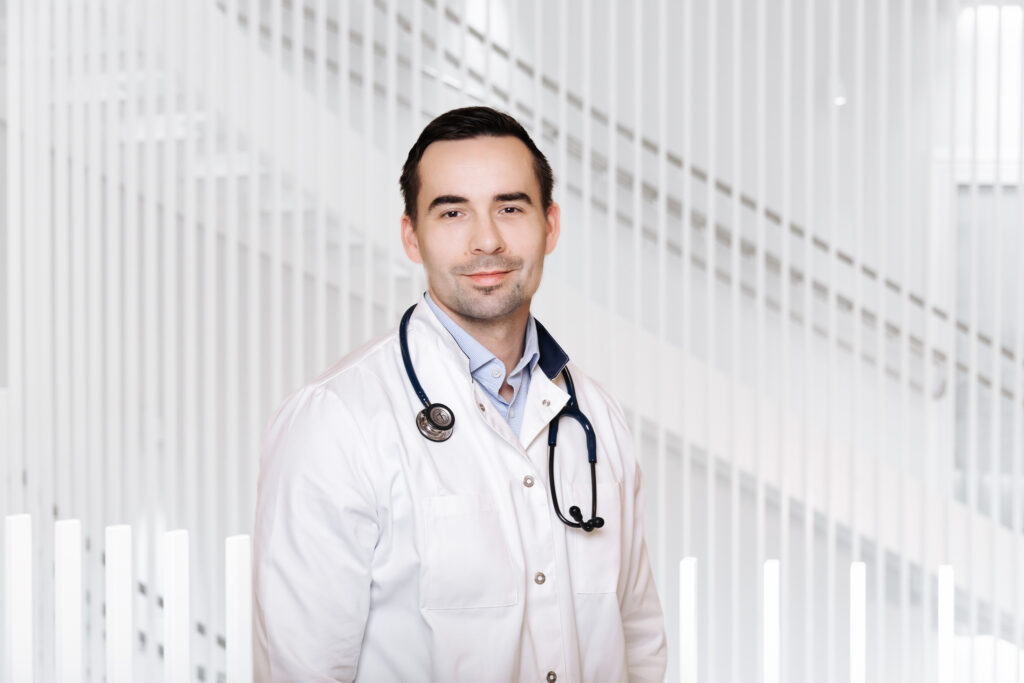
Jevgeni Serov
Anesthesiologist
Working languages: Estonian, Russian, English, Finnish
Jevgeni graduated from the Faculty of Medicine at the University of Tartu with a specialization in Anesthesiology and Intensive Care. He has worked for several years as both a general practitioner and a specialist in hospitals in Estonia and Finland.
Jevgeni’s goal is to help people prevent health problems by providing comprehensive health audits and personalized counseling. He emphasizes that taking care of one’s health should not start only when illness appears.
“Thanks to my long-term experience in emergency medicine and in preoperative counseling as an anesthesiologist, I can notice early warning signs that routine check-ups often miss,” says Jevgeni. In his view, a patient’s health is not just a collection of lab results – it is a whole that requires an individual and thorough approach.
In his work, Jevgeni relies solely on evidence-based data and continuously develops his expertise by attending international conferences and trainings.
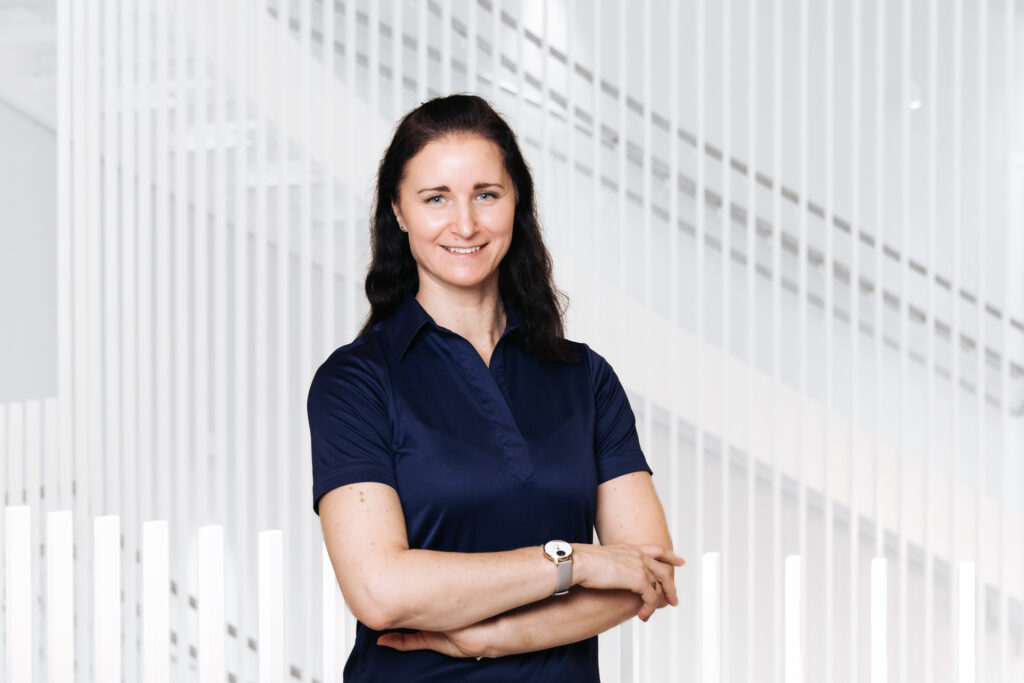
Helen Leppik
Movement counselor and medical assistant
Working languages: Estonian, English
Helen graduated in Exercise Science and Sports Management from the University of Tartu and holds internationally recognized qualifications as a personal trainer: EREPS (European Register of Exercise Professionals) Level 4 and FAF Estonia (Fitness Academy of Finland) Level 4. In addition, she has a Level 4 swimming coach certification from the Estonian Olympic Committee.
Helen has completed numerous professional training courses, and her background in sports is further enriched by a degree in Logistics from Tallinn University of Applied Sciences. She has worked as a trainer for over 15 years and as a movement counselor and medical assistant in healthcare for more than seven years. Her broad experience also includes serving as Head of Studies at Kalev Swimming School and as a youth coach at Tabasalu Swimming Club.
Helen firmly believes that physical activity is an inseparable part of every person’s health and quality of life. She aims to help people find their own “movement prescription” that supports healthy habits and well-being. In her work, Helen values an evidence-based and personalized approach. She believes that just as humans are made to breathe, they are made to move—and that it is important to gain health, not time.
Jaanus graduated in Psychology from Audentes University. In addition, he completed Levels 1 and 2 of the Erickson Solution-Focused Coaching training program, accredited by the ICF (International Coaching Federation).
Jaanus has more than 30 years of professional experience: he has worked extensively in marketing and sales, as an entrepreneur and startup leader, and as an adult trainer. He is currently focused on solution-focused coaching in the field of mental health and personal development. Jaanus regularly participates in coaching community events and keeps up with new trends in coaching through books and webinars. He is a member of both the international and Estonian chapters of the ICF (International Coaching Federation).
According to Jaanus, every person has inner resources, and coaching helps to unlock them. “Often the solutions are obvious, but they are difficult to notice on your own. We are used to physical training, but our mindset also needs training. A coach, as a thought trainer, helps to see situations from an outside perspective and, through various techniques, discover solutions together and inspire action,” says Jaanus.
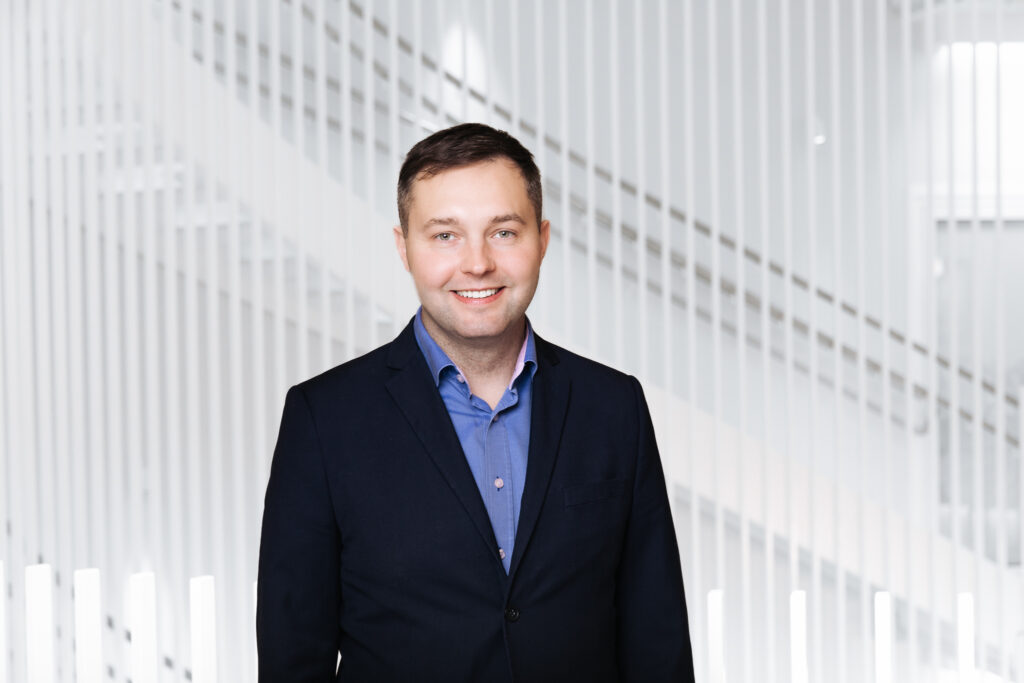
Silver Uustalu
Development Manager
Working languages: Estonian, English
Silver graduated from the Institute of Health Sciences and Sports at Tallinn University and obtained an MBA (Master of Business Administration) from EBS (Estonian Business School).
For over ten years, he has been involved in the development and management of private healthcare companies. Under Silver’s leadership, several new medical services and technologies have been developed and brought to market in companies such as Terviseuuringud and MedReport.
In the healthcare field, Silver has a particular interest in monitoring and managing hypertension and cholesterol. When it comes to maintaining health, he highly values regular physical activity.
“In both business and life in general, I consider open and friendly communication important. I believe in teamwork based on cooperation and in synergy,” Silver explains his values in developing and managing companies.
